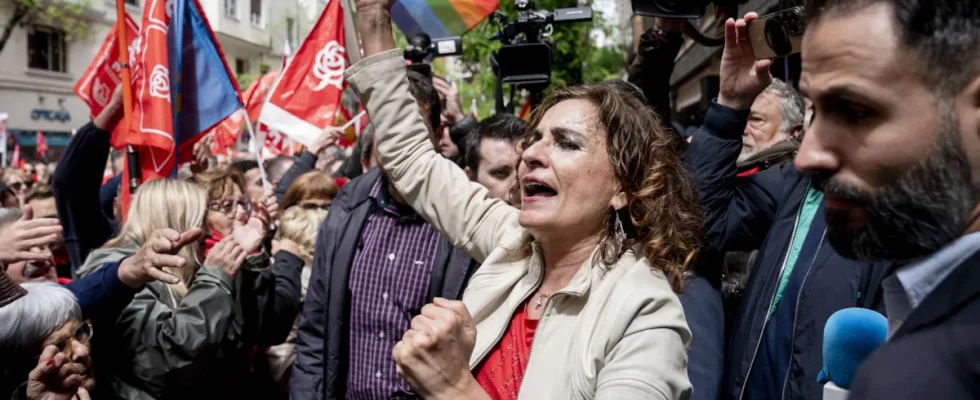Does he stay or does he go? That is the question that has been on Spain’s mind this weekend. Bets were placed, speculation spread and, at times, there were violent protests and demonstrations. Only one thing remained unclear: what decision Prime Minister Pedro Sánchez will announce. Last Wednesday evening he wrote a letter to the public saying that he was considering his resignation and announced that he would have time to think about it over the weekend.
The unusual, personal letter that Sánchez shared on the X platform has divided the country. Some see the trigger for Sánchez’s frustration – a court case following a complaint filed by a right-wing lobby group against Begoña Gómez, Sánchez’s wife – as a cheap, baseless attack. Others believe the allegations are the tip of an iceberg.
In fact, there is no compelling evidence of possible wrongdoing on the part of Sánchez’s wife. The sheer number of sometimes speculative suggestions of mistakes made by Gómez and her consulting company raises doubts about the weight of the individual accusations. Begoña Gómez and her company are accused of receiving an annual fee of 40,000 euros for consulting services from the Globalia Group, to which the airline Air Europa belongs. This happened while the government, led by her husband, saved the airline from the Corona bankruptcy with more than 600 million euros.
What is ignored is that the Globalia contract was concluded in January 2020, when the corona pandemic hardly played a role and subsidies for the private sector were not part of the political agenda. In addition, the lobby group “Manos Limpias” admitted that its ad was based on media reports.
Conservatives and right-wingers accuse him of taking the country “hostage.”
While Prime Minister Sánchez remained silent at the weekend as announced – he was unreachable, a coalition partner reported to the online newspaper El Confidencial – opponents and supporters expressed themselves even more vociferously in the Spanish media. Conservatives and right-wingers accused Sánchez of taking the country “hostage” with his five-day break. Opposition leader Alberto Núñez Feijóo called on him to stop “navel-gazing” that Sánchez was “not a head of government worthy of the country” from day one. Santiago Abascal, leader of the ultra-right party Vox, accused the Socialist leader of taking refuge in the role of victim.
This was opposed by more than 10,000 people who filled the streets around the headquarters of the Socialist Party PSOE on Madrid’s Calle de Ferraz on Saturday morning. “Quédate!”, “Stay,” the crowd chanted, and “no pasarán,” “they won’t get through,” which was the battle cry against the fascists during the civil war.
The annual meeting of the Socialists turns into a pro-Sánchez demonstration
Inside the party headquarters, the 250-strong Socialist Party Council met for the annual meeting, or what would normally have been the annual meeting. Because the conference turned into a pro-Sánchez demonstration in Sánchez’s absence. Almost the entire PSOE leadership and its ministers sought refuge in the crowd of their supporters after their speeches.
In particular, Sánchez’s first deputy, Finance Minister Maria Jesús Montero, encouraged the prime minister to stay in office in a combative, streamed speech. Turning to his wife, she shouted to thunderous applause from the delegates: “Begoña, comrade, we stand with you!”
Montero’s support for the withdrawn head of government was not without symbolic effect, as she would be his natural successor if Sánchez, who has been in power since 2018, resigns this Monday. In this case, there would be two scenarios: Montero leads the government on an acting basis until parliament is dissolved (which is possible at the end of May at the earliest) and new elections are held in the summer. Or Montero convinces King Felipe VI to propose her to the current parliament as the new head of government for the remaining three years of this legislative period. Congress would then have to vote on them, as it did with candidate Pedro Sánchez in November.
Frustration with the fragile multi-party coalition in Congress
However, if Montero takes office with an unchanged majority, she would inherit the mountain of hassle that comes with the fragile multi-party coalition in Congress, which has undoubtedly contributed to Sánchez’s frustration. Four separatist parties from Catalonia and the Basque Country must be voted in favor of, as does a troublesome group of left-wing Podemos MPs. In addition, there is an opposition that sees a large part of its raison d’être in hacking at political opponents rather than scoring points with factual policy.
However, other scenarios are conceivable: Sánchez returns more combative than ever and continues to lead his left-wing socialist government. Or the party will entrust the succession to someone other than Montero. A possible candidate would be the previous education minister and government spokeswoman Pilar Alegría.
Several civil organizations had called for a rally near Madrid’s central train station on Sunday evening. The aim was to counter the attacks of the right under the motto “For the love of democracy”. Important actors in the cultural world have also thrown their support behind Sánchez. Like the newspaper ABC reported that the director of the Cervantes Institute, Luis García Montero, wanted to call on the gathering on behalf of cultural workers to defend “democratic decency”. Unions want to use May Day to “outcry” for more democratic rights.
The leaders of the separatist parties also want to preserve their chance of further progress towards Catalonia’s independence: Pere Aragonès, the incumbent Prime Minister of Catalonia, warned Sánchez in front of journalists – a withdrawal would “play into the hands of the extreme right.” Carles Puigdemont, head of the Junts per Catalunya party, indicated that he would continue to support Sánchez if he was prepared to “reach a historic agreement” with Catalonia.

